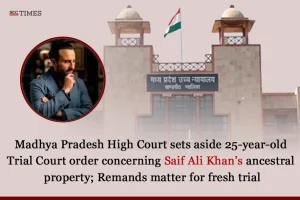Madhya Pradesh High Court: In a set of two appeals filed by actor Saif Ali Khan’s family against a Trial Court judgment which dismissed the partition suits preferred by the appellants, the Single Judge Bench of Sanjay Dwivedi, J., allowed the appeals, holding that the Trial Court had dismissed the suits while placing reliance on an overruled decision of the Allahabad High court without considering other aspects. The Court accordingly remanded the cases to the Trial Court to be decided afresh.
Background
As per the appellants, Mohd. Hamidullah Khan (‘deceased Nawab’) was the Nawab of Bhopal riyasat, and he died in 1960. The suit property was his personal property. The appellants and respondents were the legal heirs of the deceased Nawab, whose genealogy is as under:
In 1949, the Bhopal riyasat merged into the Union of India under an agreement. Clause II of the agreement stated that after the merger, all the special rights which the deceased Nawab had shall continue. Further, according to Clause V of the agreement, it was agreed that all the property which is their personal property shall be of their absolute ownership, and succession of the ‘gaddi’ (throne) shall be under the Bhopal Succession to the Throne Act, 1947 (‘Throne Act’).
Allegedly, the suit property was the personal property of the deceased Nawab. Upon his death, according to Clause VI of the Throne Act, defendant 1 was declared as the Nawab, and the Government of India, vide its letter dated 1962(‘Government Order’), mentioned the personal property under Article 366(22) of the Constitution as personal property of defendant 1.
The appellants contended that the Government Order was unlawful as, upon the death of the deceased Nawab, partition of his personal property (suit property) should have been done between the appellants and respondents according to Muslim Personal Law instead of being declared as the absolute personal property of defendant 1. Therefore, the appellants filed the suit for partition, possession, and settling the account of the estate left by the deceased Nawab.
The respondents contended that inheritance under the Throne Act was under the primogeniture rule, and the successor of the throne used to be the absolute successor of the personal property of the Nawab. According to the defendants, the suit property belonged to the deceased Nawab as his personal property, and it could not be partitioned according to Muslim Personal Law. Since defendant 1 became the Nawab and the Government Order declared her as the sole successor of all the private properties held by the deceased Nawab, the suit property could not be partitioned.
The Trial Court dismissed the suits vide the impugned judgment, holding that the issues involved had been squarely covered by the Allahabad High Court in Talat Fatima Hasan v. Nawab Syed Murtaza Ali Khan Sahib Bahadur 1996 SCC OnLine All 429.
Aggrieved by the Trial Court’s decision, the appellants filed the present appeals.
Analysis
The Court noted that the Trial Court dismissed the suits filed by the appellants while relying upon Nawab Murtaza (supra) but failed to consider that Nawab Murtaza (supra) was overruled by the Supreme Court in Talat Fatima Hasan v. Syed Murtaza Ali Khan, (2020) 15 SCC 655. Since the legal issue on which the Trial Court was relying had been reversed and the suits in question were of partition, the Court opined that these cases could be remanded to the Trial Court for deciding them afresh as per Order 14 Rule 23A of the CPC.
In this regard, the Court placed reliance on Shivakumar v. Sharanabasappa (2021) 11 SCC 277, and Vipin Kumar v. Sarojani1, which dealt with the Appellate Court’s power to remand a case back to the Trial Court.
Given the aforesaid, the Court held that since the Trial Court dismissed the suits without considering the other aspects of the matter by relying upon the judgment which had already been overruled by the Supreme Court, the matters needed to be remanded back to the Trial Court for deciding it afresh. This was because the suits were for partition, and if ultimately, the Trial Court concluded that the suits had to be allowed then share of the parties could be determined only by the Trial Court while passing the preliminary decree and the Trial Court itself could further finalise that after carrying out the necessary formalities of partition.
Thus, the Court set aside the impugned judgment and remanded the cases back to the Trial Court for deciding it afresh, and if so required, the Trial Court could allow the parties to lead further evidence given the subsequent developments and changed legal position. The Court further directed that since the suits were initially filed in 1999, the Trial Court shall make all possible efforts to conclude and decide them expeditiously, preferably within one year.
Accordingly, both appeals were allowed.
[Begum Suraiya Rashid v. Begum Mehr Taj Nawab Sajida Sultan, 2025 SCC OnLine MP 4819, decided on 30-06-2025]
Advocates who appeared in this case :
For the Appellants: Aadil Singh Bopari, Abhishek Dubey, Ayesha Jamal, K. Jaggi, and Gurlabh Singh Sidhu
For the Respondents: Senior Advocate S. Sreevastava, Arjun Rao, Sooraj Bajpai, Aishwarya Vikram, Shrikant Mishra, Siddharth Sharma, Adil Usmani, Akhilesh Jain, Senior Advocate Sanjay Agrawal, Sheersh Agrawal, Sanjeev Tuli, Varun Tankha and Harshit Bari
Buy Constitution of India HERE
1. Misc. Appeal No. 479 of 2011

